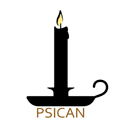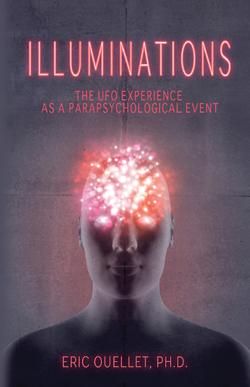Title: Illuminations: The UFO Experience as a Parapsychological Event
ISBN-193839853X
Author: Eric Ouellet, Foreword by Jenny Randles
Publisher: Anomalist Books
Subject: UFOs / Parapsychology
What other researchers are saying:
“Parapsychological approaches in this field are rare: your contribution is precious, and it is very timely.” —Jacques Vallée, author of The Invisible College
“As a sociologist and a UFO witness, plus, importantly, a parapsychological researcher, Eric Ouellet ticks all the boxes to appreciate the bagatelle of curiosities that I have encountered in the field during 40 years of UFO investigation.” — Jenny Randles, author of Mind Monsters
"A truly thought provocative book, that is destined to become a classic" - Sue Demeter St.Clair
It was a pleasure for me to work on this book with the author, who is a dear personal friend and a longtime colleague. I am, therefore very happy to present this interview I conducted with Eric which will help readers of the book and the PSICAN website get a better idea of where Eric is coming from with his ideas. Enjoy!

Can you tell us a little about yourself and your background?
I am a professor with the Royal Military College of Canada, and Head of the Department of Defence Studies in Toronto. I am sociologist, and got my Ph.D. in that discipline from York University. I am also a professional member of the Parapsychological Association, and I am the liaison officer for Canada. I have in interest in the paranormal, and UFO in particular, since my childhood, but I have been researching the topic actively for over 10 years now. I am originally from Quebec City, and French is my first language.
What initially sparked your interest in UFOs and the paranormal in general?
My interest about UFOs and the paranormal has emerged mostly because of my personal experiences. As a kid, although I did not see a UFO, I witnessed my family members going frantic about observing one. Then, I had many experiences that people would qualify as paranormal, such as precognition, telepathy, psychokinesis with electronic equipment, remote viewing, and much later in life observing a UFO.
Can you explain to us what Parasociology is about?
Parasociology is term that I developed to represent the type of research I do. It is inspired from the concept of “parapsychology,” which is a particular sub-field of psychology interested in an anomalous individual experiences. I take a similar approach, focussing on anomalous experiences, but I apply the research at the level of societies, and larger collective of people, rather than at the individual level. One of my tool is to use the concept of psi from parapsychology, and integrate it into sociological research. For instance, I looked at some large scale Marian apparitions that occurred in Egypt in the late 1960s, witnessed numerous times by thousands of people, and analyzed them as some sort of large scale recurrent spontaneous psychokinesis event, using models and concepts borrowed from parapsychology.
Who do you consider to be the greatest influences on your thoughts when it comes to UFOs and Parasociology? And why?
When it comes to UFOs the real pioneers that I find the most inspiring are Jacques Vallée and John Keel. They were the early voices who could see that UFO events are very much of a paranormal nature and that large social issues seem to be in part at the source of such phenomena. For the larger field of Parasociology, Carl Jung who brought so many key foundational concepts to understand what we call the paranormal, and Walter von Lucadou, a German parapsychologist who developed the most advanced models and concepts to study psi phenomena to this day.
What inspired you to write Illuminations?
After spending several years writing on my blog Parasociology, I decided that some of my ideas were getting mature enough to be published into a book. I was also quite frustrated by the sorry state of ufology. The serious study of the UFO phenomenon reached an all-time low, where no one is really trying to push for news ideas. Many of those interested in UFO just gave it up after nearly two decades (1980s and 1990s) of hysterical writings about conspiracies, leading to nowhere. Those still interested in UFO from the point of view of the Extra-Terrestrial Hypothesis (ETH), still have nothing to show for, and they have more or less stopped doing research, waiting that “the government” will reveal anything (as if “they” know anything more than us). It was time to get a fresh look at the topic, and rescue the good work done before the conspiracy theorists took over.
Which case in the book intrigues you the most, and why?
The Belgian UFO wave of 1989-1991 is the one I find the most intriguing. It was well documented, probably the best documented UFO event ever in my opinion, by both UFO researchers and the authorities, and it remains a real mystery in many aspects. Yet, the wave happened at the very same time that the very powerful institutions created by the Cold War were quickly falling apart in Eastern Europe. It was quite an interesting coincidence, to say the least.
What's your assessment of the current state of UFO studies and research? What is right with the study of UFO today? And what is wrong?
The field of UFO research has shrunk quite a lot, and it is in some respects in a state similar to the late 1960s and early 1970s, where only a few people were doing serious research. The dust from the conspiracy theory era is settling down, but the damage is extensive in terms of general loss of interest and reduced legitimacy for the topic. There is still an “invisible college,” so to speak, but it is hiding not from the authorities. It is not visible because these people are absolutely not interested in engaging in fruitless discussions with the remnants of the conspiracy theorists and the mindless believers in the ETH. The focus of research is now broader than in the past. Although the physical aspects of UFO remain an important part of the research, the interest in the cultural and sociological dimensions is more prevalent than in the past. The field of parapsychology, however, has not budged much on its lack of interest about the UFO phenomenon. It is very unfortunate because the study of UFO events through the lenses of parapsychology would benefit both ufology and parapsychology.
Our readers may be familiar with the Parapsychological Assoc. (P.A) and that you are the Canadian liaison. What is the one thing that excites you within Parapsychology today?
The field of parapsychology is evolving slowly, but with the increase influx of social scientists and historians interested in studying anomalous phenomena on their own term, many new possibilities are now opening to go much beyond the strictly psychological aspects of the paranormal. It allows new and very different approaches and methodologies to be used to study the paranormal.
In the book you state that UFOlogy and Parapsychology have been like "oil and water" in popular sentiment. Is this still the case in your opinion, and if so do you believe it will change?
Most parapsychologists with a training in individual psychology have difficulties to see why the study of UFOs might be beneficial to the discipline. Yet, those with training in social sciences and humanities can clearly see that the social aspects are actually critical to understand anomalous phenomena, and UFOs, given their persistence, are a good object of study to address the social dimensions of the paranormal. The main problem resides in the perceived danger of being assimilated to the “wackos” of the ufology. As long as ufology is still perceived as a preserve of conspiracy theorists and “true believers” in the ETH, then the reluctance of parapsychologists to engage on UFOs will remain.
As a professional academic has your work in these topics ever created any challenges?
No. I never encountered any issues because of my interests and publications related to the paranormal.
Do you have any advice or suggestions for young scholars who may want to study UFOs or other highly controversial subjects?
The main problem of these types of research is that they do not lead to developing a strong academic profile. My advice is to become very good at some more traditional types of research, build an institutional profile, publications, and network, but continue to work on your paranormal research on the side. Once you have established yourself as an academic in a traditional topic, then you start switching emphasis and do more of what you really like to research. It is all about patience and hard work.
What current author aside from yourself do you consider a must-read for information on these topics?
I definitely recommend to read George Hanson’s The Trickster and the Paranormal, as well as the works of Jeffery Kripal. They both bring a lot of fresh ideas about the study of anomalous events. The parapsychologist Dean Radin has also a lot of useful books to understand the state of parapsychology.
What are you working on now?
I am working on developing analytical tools to understand smaller scale UFO observations, if compared to a UFO wave, by investigating the research done to this point on apparitions. I think that many UFO experiences are subjective events of an apparitional nature and hence are sorts of hallucination. Yet, some of those hallucinations’ content appear to be objective and acquired through extra-sensory perceptions.
Where can we purchase your book or see your research?
My book can be purchased online through Amazon and Barnes and Nobles, both in paper and electronic format. You can also connect through the publisher Anomalist Books. I continue to publish new emerging ideas and research, although at a slower pace, on my blog at parasociology.blogspot.com
Tell us what you like to do when you aren't working on your research?
Well, to start with, I have three kids at home who keep me quite busy. Then, there is the rest of my work that is not involving research, such as teaching and running the Department of Defence Studies. On my free time, I like to watch political thrillers and espionage movies, and play board games. I enjoy also doing bike rides.
Is there anything else you would like to add that I haven't included?
I would like to thank PSICAN, and especially Sue Demeter, for the support, encouragement, and exchange of views they provided over the years. Research on the paranormal is really no different than research in other fields, it is a collective effort where rubbing news ideas is a critical to progress.



